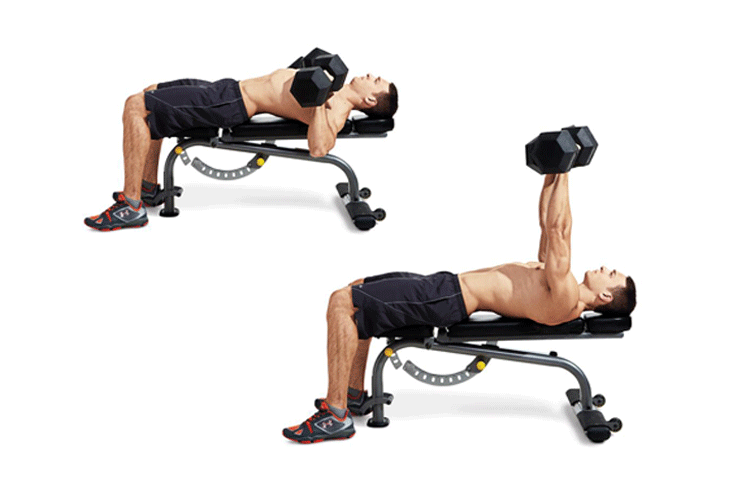The dumbbell bench press, a staple in any strength training or bodybuilding routine, is a timeless and versatile exercise. With a pair of dumbbells and a sturdy bench, you can challenge your upper body in a unique and efficient manner. Today, we will deep dive into the nuances of the dumbbell bench press, its benefits, technique, common mistakes, and variations.
Mastering the Dumbbell Bench Press: A Comprehensive Guide
Why Dumbbell Bench Press?
While the barbell bench press often steals the limelight, its dumbbell counterpart has a robust list of benefits that deserve recognition. Let’s delve into the reasons why the dumbbell bench press should be a regular part of your exercise routine.
Increased Range of Motion
With dumbbells, you can descend deeper at the bottom of the lift, engaging your pectoral muscles more intensively. This added range of motion can help stimulate more muscle growth in your chest, shoulders, and triceps, leading to increased strength and muscle development.
Improved Stabilization and Balance
Unlike the barbell bench press, the dumbbell version requires each arm to work independently, making stabilization muscles and smaller support muscles work harder. This independence of movement can correct imbalances and asymmetries in strength, form, and muscular development, providing a more balanced physique.
Joint-Friendly
Due to the freedom of movement provided by dumbbells, you can adjust the angles to suit your body mechanics better, making the dumbbell bench press a safer alternative for those with shoulder issues.
The Perfect Technique

The effectiveness of the dumbbell bench press hinges on proper technique. Let’s break down the steps:
Setup: Start by sitting on a flat bench with a dumbbell in each hand. Lay back and hold the weights with a neutral grip (palms facing each other), at chest level.
Press Up: Push the weights upwards until your arms are fully extended. Ensure your wrists are straight, and your palms are now facing your feet. Breathe out as you push up.
Lower Down: Slowly lower the weights in a controlled manner back to the chest level, ensuring your elbows are at about a 90-degree angle. Inhale as you lower down.
Repeat: Repeat for the desired number of reps.
Common Mistakes and Corrections
Every exercise, including the dumbbell bench press, has potential pitfalls. Being aware of these can help you avoid injury and increase the effectiveness of your workouts.
Incorrect Elbow Position
Flaring out your elbows excessively can put undue pressure on your shoulder joints, potentially leading to injury. Instead, keep your elbows at a 45-degree angle relative to your body.
Inconsistent Movement
Lack of control in the movement, such as letting the weights drop quickly or pushing up too fast, can cause injury and decrease effectiveness. Focus on maintaining a slow, steady tempo.
Unbalanced Weights
Using dumbbells that are too heavy can lead to an imbalance in your lift. Always ensure you can control the weights throughout the full range of motion.
Variations and Progressions
The beauty of the dumbbell bench press lies in its adaptability. Here are a few variations you can add to your workout:
Incline Dumbbell Press
By adjusting the bench to an incline, you shift more emphasis onto the upper portion of your chest and shoulders. This is a fantastic way to add variety to your chest workouts and target muscle groups from different angles.
Decline Dumbbell Press
With the bench adjusted to a decline, you place more stress on the lower portion of your chest. This variation can help to develop a well-rounded and balanced chest.
Dumbbell Floor Press
The floor press eliminates the use of your lower body, which shifts all the tension onto your upper body. This variation can be a great way to focus on your chest, triceps, and shoulders, while also reducing the risk of lower back strain.
Single-Arm Dumbbell Press
Pressing one dumbbell at a time tests your balance, recruits your core for stabilization, and addresses unilateral strength imbalances. This variation adds a whole new level of challenge to the exercise.
Effective Integration into Your Routine
The dumbbell bench press can be seamlessly integrated into your workout routine, whether you’re following a full-body plan, a push/pull split, or an upper/lower split. As a compound exercise, it’s typically performed towards the beginning of a workout, when you’re freshest.
The sets and repetitions depend on your goals. If you’re looking to build strength, aim for 3-5 sets of 5-8 reps with heavier weights. For hypertrophy (muscle size), aim for 3-5 sets of 8-12 reps with moderate weights. For endurance, aim for 2-3 sets of 12-20 reps with lighter weights.
Wrapping Up
The dumbbell bench press is a fantastic addition to any strength training or bodybuilding routine. Its versatility and adaptability offer benefits for lifters of all levels.
Whether you’re a novice lifter hoping to build up your upper body strength or an advanced athlete aiming to shake up your routine, the dumbbell bench press is an exercise that warrants serious consideration. Remember, like any weightlifting exercise, it’s important to always prioritize form over the weight lifted to prevent injury and maximize benefits.
The dumbbell bench press may be slightly overshadowed by its barbell counterpart, but as we’ve explored, it can deliver substantial results. So, grab those dumbbells, find your bench, and press on. The road to a stronger, more balanced physique awaits.
